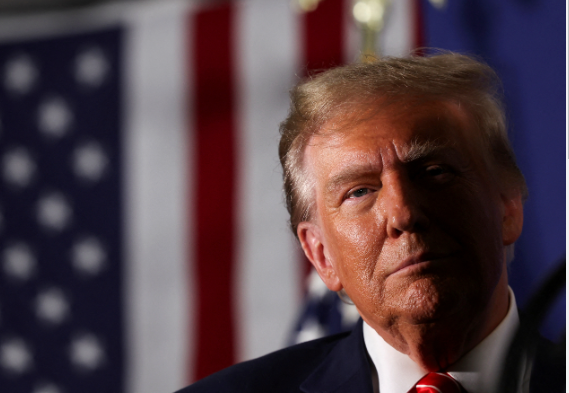
On Wednesday, the U.S. Supreme Court decided to consider Donald Trump’s request for immunity from prosecution regarding allegations made by a special counsel concerning his attempts to reverse his election defeat in 2020. This decision brings the nation’s highest court back into the political arena as Trump attempts to win back the presidency.
The judges suspended the criminal case that Special Counsel Jack Smith was pursuing and will now consider a lower court’s denial of Trump’s request for immunity from prosecution on the grounds that he was president at the time he took steps intended to overturn President Joe Biden’s electoral victory. With severe ramifications for the presidency in the event that such immunity was not granted, Trump’s attorneys had asked for a stay of that decision.
In a 3-0 decision on February 6, the U.S. Court of Appeals for the District of Columbia Circuit dismissed Trump’s appeal for immunity, rejecting his request for “unbounded authority to commit crimes that would neutralize the most fundamental check on executive power — the recognition and implementation of election results.”
The front-runner for the Republican nomination to face Democrat Joe Biden on November 5th in the US election is none other than Trump, the first former president to face criminal prosecution.
In August 2023, Special Counsel Jack Smith filed four federal criminal charges in the case of electoral subversion against President Trump. Trump’s pursuit of immunity caused the trial scheduled for March 4 to be rescheduled; no new date has been announced. Three other criminal cases involving him are pending trials. In each case, Trump has entered a not guilty plea in an effort to cast them as motivated by politics. On February 12, his attorneys asked the Supreme Court.
A months-long criminal prosecution would “radically disrupt” Trump’s capacity to campaign against Biden, they claimed in a filing to the Supreme Court. They also threatened to use political prosecutions, extortion, blackmail, and other terrible measures against future presidents should Trump’s prosecution be permitted.
According to Smith’s accusations, Trump planned to mislead the country, obstructed Congress’s certification of Biden’s electoral victory and planned to do so, and conspired to restrict Americans’ ability to vote.
Trump and his supporters claimed that the 2020 election was rigged, and they came up with a scheme to utilize fictitious electors to prevent Congress from certifying Biden’s win. Additionally, Trump made an effort to exert pressure on Vice President Mike Pence to halt the certification process. In an effort to stop the certification, Trump’s supporters stormed the Capitol.
In the event that Trump wins back the president, he may utilize his authority to stop the prosecution or even to grant himself a pardon for any federal offenses.
In October of last year, Trump filed a request to have the charges dropped on the grounds that he was exempt from prosecution for acts taken as president. Dec. 1 U.S. District Judge Tanya Chutkan denied that allegation, which prompted Trump to file an appeal with the D.C. Circuit.
One of Trump’s attorneys informed the three D.C. Circuit judges during the January arguments that a president cannot be prosecuted for a crime unless he is first impeached and found guilty in Congress, even if he sold pardons or military secrets or gave the order for a Navy commando unit to kill a political rival.
The three-judge panel unanimously rejected Trump’s claim of immunity, writing, “We cannot accept that the office of the presidency places its former occupants above the law for all time thereafter.”
Trump appoints three justices to the conservative majority of the Supreme Court, which numbers 6-3.
On February 8, the justices heard arguments in a different Trump case that could have an impact on the election in November. The judge expressed doubt about a decision made by Colorado’s highest court to disallow Trump from running in the state’s Republican primary on the grounds that it violated the 14th Amendment of the United States Constitution. The judge also claimed that Trump had participated in an uprising connected to his supporters’ attack on the Capitol building on January 6, 2021.
Trump, who was president from 2017 to 2021, has broadened his claims of immunity both during and after his time in office.
U.S. Attorney General Merrick Garland appointed Smith in 2022 to look into Trump’s activities following the 2020 election and his keeping of secret records after he left the White House in 2021. Smith accused Trump of violating both of these things.
The two that Smith is pursuing in a Georgia state court, which also concerns his attempts to overturn his 2020 defeat, and the one in a New York state court concerning hush money paid to a porn star are among the four criminal charges against Trump that are still pending.
In 2020, the Supreme Court rejected Trump’s claim that, as president, he was exempt from a subpoena that was issued as a part of a state criminal investigation.
In an additional case, the justices have consented to render a decision on whether to prosecute a man implicated in the Capitol attack for obstructing a formal process, namely the congressional certification of the 2020 election results. Smith filed two charges connected to obstruction, so there could be ramifications for Trump in that case.
